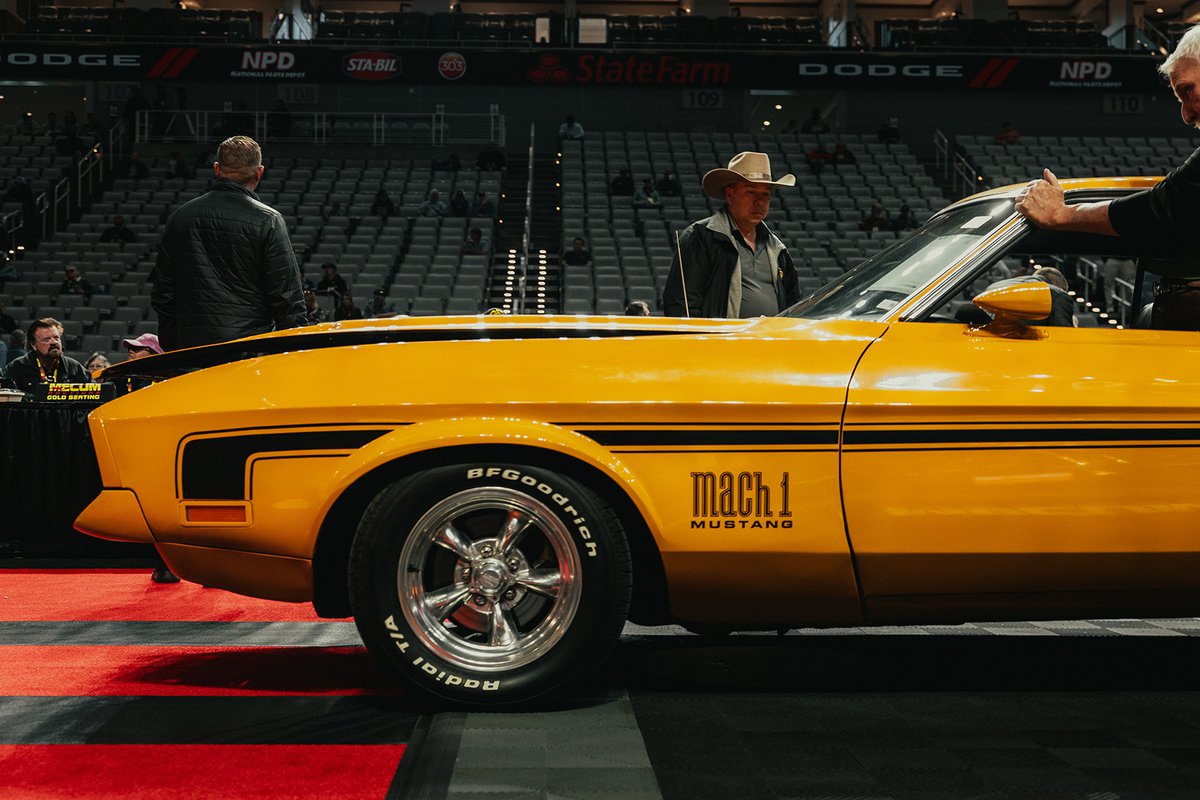Fort Worth’s Dickies Arena recently roared to life with the sound of engines, gavel strikes, and excited chatter — the Mecum Dallas/Fort Worth Auto Auction had arrived. After stepping inside — it’s impossible not to be swept up in the spectacle: Chevys, Fords, and even Harleys gleamed under bright lights, each car a prize, each hammer fall a story. For enthusiasts, this four-day auction, held from October 29 to November 1, was part auction, part car show, and part history lesson all in one.
For me, it was the 1970 Plymouth Superbird that stole the show — its signature nose cone and racing stripes practically vibrating under the arena lights. Valued well past 200k, it was a reminder that some cars are more than machines; they’re monuments. Growing up, I spent 17 years on a car lot with my dad, who specialized in American muscle. Walking the auction floor, I realized how much of that upbringing had become second nature: a knack for spotting the right lines, the right angles, the right car that could change hands for a small fortune in a matter of minutes.
An estimated 1,500 vehicles crossed the block, including five private collections. Collector favorites ranged from a 1986 Porsche 930 Turbo to 38 Camaros — including a rare 1969 Nickey Camaro Stage III and a classic 1969 Z28 — as well as pickups from a 1937 Chevrolet Custom to a 2016 Ford F-350 Super Duty Custom. The auction streamed live on ESPN+ and Mecum.com over four days, making it a nationwide spectacle.
Among the private collections, Jack Shewmaker’s assemblage stood out — pickups spanning the 1910s through the 1960s and a 1947 Frazer Manhattan Sedan, representing a life spent innovating at Walmart. The Tom Katinic Collection brought Hollywood to Texas: a 2010 Ford Shelby GT500 Super Snake from “Deadpool 2” and “The Interview,” a 1969 Mercury Cougar from “Supernatural” and “Bad Times at the El Royale,” and dozens more.
Pulling back the curtain behind the auction block revealed the precision and choreography behind each sale. Mecum’s Chief Operating Officer, Sam Murtaugh, described the process like a touring rock concert.
“Everything fits in our trucks the way we need it, so we can arrive, set up, and if we can get this place ready in a day, we’re onto the next show two days later,” he said.
The operation runs like clockwork, from check-in to vehicle inspection, staging, and detailing — a nearly 200-person crew ensuring every car looks its best under the lights. And this year, just so happened to be Mecum’s first in Cowtown.
Murtaugh laughed when asked about the Mecum crew.
“You have to have good people. People who are committed to doing what it takes. That’s what makes this work. It’s a family-owned business, and we treat every car like it’s our own,” he said, recalling decades of auctions, some small and chaotic, others commanding millions in bids.
On the floor, first-time buyers Dustin Ratliff and Evan Purvis embodied that thrill and chaos.
“It was pretty cool,” Ratliff said, “a little hectic. I had 13 cars I came to look at.” Finding them, however, was another story. “You’re better off standing right where they come on the line and going across,” Purvis added. Their initial plan was modest — “Evan isn’t a car guy. He doesn’t like spending money,” Ratliff admitted — but after ten beers, they walked out with eight cars, a motorcycle, and a Hummer.
The highlight for Ratliff? A 1957 Ranchero.
“My granddad had one. I didn’t get to ride with him, but I knew it was a cool car — something he probably wouldn’t have bought. Maybe for baling hay, I don’t know. But I got it, and it felt right.”
Bidding itself is a performance. David Morton, senior communications manager for Mecum, explained the auction sequence: cars are grouped strategically to maintain momentum.
“Spectators want to see cars sell,” he said. “We throw in the higher-priced cars every so often to get people excited. We want the energy up, not the frustration.”
When the gavel comes down, ownership is legally transferred — a system built on trust, handshake agreements, and decades of experience.
By the end of the weekend, Mecum Dallas/Fort Worth had delivered a masterclass in American automotive culture. The top-selling lots included two 2006 Ford GTs — one fetching $632,500 and the other $484,000 — a 1963 Chevrolet Corvette Z06/NO3 Tanker coupe at $418,000, a 2009 Mercedes-Benz SLR McLaren Roadster at $390,500, and (my fave) — the 1970 Plymouth Superbird —sold at $363,000.
Walking out of Dickies Arena, engines still echoing in the cavernous space, it’s clear that Mecum Auctions is more than a marketplace. It’s a celebration of craftsmanship, legacy, and the thrill of the hunt — where buyers, sellers, and spectators alike connect to the cars they love and the memories they cherish.
As Morton put it, “At the end of the day, it’s about giving people a chance to see these incredible machines, appreciate the history behind them, and be part of something that’s bigger than any single car — it’s about family, passion, and the joy of the auction.”
